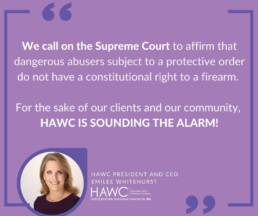This month, HAWC submitted an amicus curiae brief urging the Supreme Court to keep guns out of the hands of domestic abusers. United States v. Rahimi will decide if current federal law, which prohibits the possession of firearms by persons under certain domestic violence protective orders, violates the Second Amendment. We are in a pivotal moment in the movement to end domestic abuse, and HAWC is taking a stand.
Every year, HAWC works closely with hundreds of survivors in imminent danger to secure protective orders. For decades, thanks to federal legislation, we have worked to ensure that those orders require gun removal when appropriate. But now the Supreme Court could decide that abusers have a constitutional right to a gun, even while they are subject to a protective order. It is outrageous that survivors stand to lose this critical life-saving strategy, especially given that guns are the leading cause of domestic violence homicides.
Sign this petition to support gun removal from dangerous domestic abusers. We cannot let the Court take this protection away!
“Ann” experienced significant trauma as a child. Sexually abused by a male family member living in the home along with gang members, she awoke frequently at night, in fear of her life from her abuser and his guns. By age 11, she had attempted suicide. When Ann finally obtained a protective order with the help of Houston Area Women’s Center, her mother reported, “I can’t erase the past, but at least I know she’ll be able to sleep now.”
HAWC worked alongside Connie Pfeiffer, Elizabeth Wyman and Lily Hann of Yetter Coleman LLP to develop our brief. In it, we share the devastating stories of survivors and outline the alarming intersection of guns and domestic violence homicides. Nearly half of all survivors who call HAWC’s domestic violence hotline in imminent danger, report guns as a threat to their safety.
- Guns are undeniably the leading cause of domestic violence homicides in our country.
- An average of 52 American women are shot and killed by intimate partners every month, according to Everytown for Gun Safety.
- When firearms are present in abusive households, the risk of homicide increases by a staggering 500%.
- Studies also confirm a link between domestic abusers and mass casualty events.
Laws restricting abusers’ access to firearms increase a victim’s chances of survival. Will the Court agree? Or will the Court sanction leaving deadly power in the hands of the abuser? That is what’s at stake.


